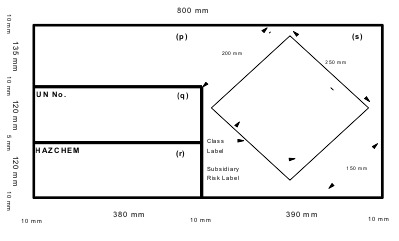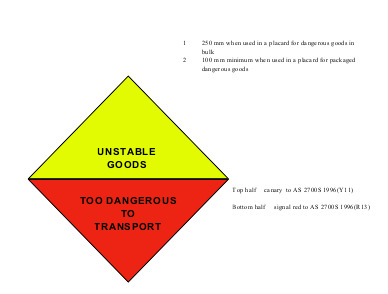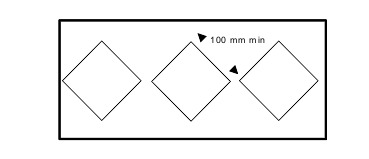 Australian Capital Territory Numbered Regulations
Australian Capital Territory Numbered Regulations Australian Capital Territory Numbered Regulations
Australian Capital Territory Numbered Regulations(see s 257)
Part 2.1 HAZCHEM warning placard
2.1 HAZCHEM outer warning placard
(1) A HAZCHEM outer warning placard must have—
(a) the form shown in figure 2.1; and
(b) dimensions not less than those shown in figure 2.1.
(2) The placard must display the word ‘HAZCHEM' in red letters not less than 100mm high and in the style shown in figure 1, on a white or silver background.
(3) In subsection (2):
"red" means the colour
‘signal red' in accordance with AS 2700S–1996 (R13) (Colour
standards for general purposes—signal red). 
Figure 2.1—Form and dimensions of an outer warning placard
Part 2.2 Information placards—tanks
2.2 Tank placards—general requirements
On an information placard for a dangerous substance stored in a tank, the numerals and letters used for showing the proper shipping name, UN number and hazchem code of a dangerous substance must be—
(a) black on a white background, unless a letter of the hazchem code is white on a black background; and
(b) if the proper shipping name requires a single line only—at least 100mm high; and
(c) if the proper shipping name requires 2 lines—at least 50mm high.
2.3 Tank placards—classifiable dangerous substances
(1) An information placard for a dangerous substance of class 2, 3, 4, 5, 6.1 or 9 stored in a tank must comply with this section.
(2) The placard must—
(a) comply with the template in figure 2.3; and
(b) subject to subsection (4) (b), have dimensions not less than those shown in figure 2.3.
(3) The placard must contain the following information about the substance in figure 2.3:
(a) in space (p)—the proper shipping name;
(b) in space (q)—the UN number;
(c) in space (r)—the hazchem code;
(d) in space (s)—the class label and subsidiary risk label (if any).
(4) For subsection (3) (d)—
(a) the class label and subsidiary risk label (if any) in relation to the substance must have the form and colouring provided by the Australian Dangerous Goods Code for dangerous goods of the same kind; and
(b) if there are 2 or more
subsidiary risk labels—the width of the right hand part of the placard
may be extended. 
Figure 2.3—Template for an information placard for a dangerous substance in a tank
2.4 Tank placards—goods too dangerous to be transported
(1) An information placard for a good too dangerous to be transported stored in a tank must comply with this section.
(2) The placard must—
(a) comply with the form shown in figure 2.3; and
(b) have dimensions not less than those shown in figure 2.3.
(3) The placard must comply with the following requirements about the substance in figure 2.3—
(a) in space (p)—the name mentioned in the Australian Dangerous Goods Code, appendix 5 for the dangerous good of the same kind as the substance must be stated;
(b) space (q) must be left blank;
(c) space (r) must be left blank;
(d) space (s) must
include the label in figure 2.4. 
Figure 2.4—Label for goods too dangerous to be transported
Part 2.3 Information placards—packaged substances
2.5 Information placards for packaged dangerous substances
(1) An information placard for packaged dangerous substances must comply with this section.
(2) The placard must—
(a) be in the form shown in figure 2.5; and
(b) be of sufficient size to accommodate the labels to be displayed on the placard; and
(c) have a white or silver background.
(3) The placard must contain the following information:
(a) the class label for each class of dangerous substances present in at least the placard quantity;
(b) if mixed classes of dangerous substances are present in at least the placard quantity for schedule 1, table 1.1, item 4—
(i) for each class of dangerous substances present in at least 50% of the placard quantity stated for the class in items 1, 2 or 3—the relevant class label; or
(ii) if no class of dangerous substances is present in at least 50% of the placard quantity stated for the class in items 1, 2 or 3—a mixed class label; or
(c) for C1 combustible liquids and fire risk dangerous substances in a total quantity exceeding 1000L—a class 3 class label; or
(d) for a good too dangerous to be transported—the
label in figure 2.4. 
Figure 2.5—Information placard for packaged dangerous substances
Part 2.4 Information placards—combustible liquids
2.6 Information placards for C1 combustible liquids
(1) An information placard for a container containing a packaged C1 combustible liquid, or a tank containing a C1 combustible liquid, must comply with this section.
(2) The placard must—
(a) be in the form shown in figure 2.6; and
(b) have dimensions not less than those shown in figure 2.6; and
(c) have black
letters on a white or silver background. 
Figure
2.6—Placard for C1 combustible liquids